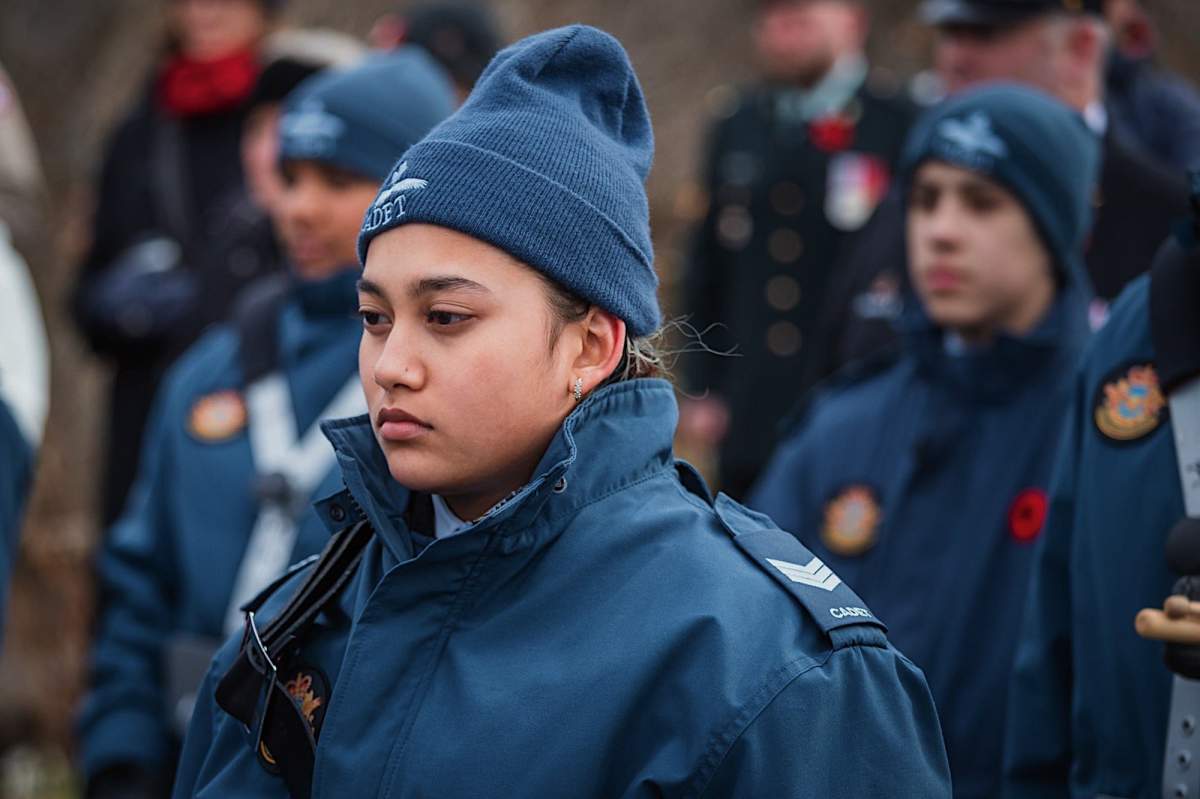
“#Wethepeople, not #youthepeople,” said another.
Since 1986, Don Cherry had been a host on Coach’s Corner, known mostly for his colourful matching suits and language. That all changed on Saturday night, however, following televised remarks in which the longtime host said “you people that come here” don’t wear poppies or support veterans.
“You people that come here … whatever it is, you love our way of life, you love our milk and honey, at least you could pay a couple of bucks for a poppy,” the host said, later receiving a near-speechless thumbs-up from his co-host, Ron MacLean, in response.
Days later, Cherry was fired.
Cherry, who initially refused to apologize for his controversial rant and said he could have kept his job as co-host of Coach’s Corner if he’d agreed to become “a tame robot who nobody would recognize,” has since told Global News that, given the chance, he would have chosen his words differently.
“I wish I had said ‘everybody’ instead of ‘you people,'” said Cherry.

Many Canadians were quick to come to the defence of those who immigrated, condemning the divisive nature of Cherry’s remarks.
Ammar Naseer, 34, a product financial manager in Toronto whose family immigrated from Pakistan to Toronto when he was 15 years old, purchased all the poppies at his local Loblaws and handed them out for free in Mississauga, Ont., a community known for its large immigrant population.
“It’s easy to blame people,” said Naseer. “When we use the words ‘you people,’ that seems to isolate classes of people. That seems to be divisive for society, and it really is hurtful.“

Get breaking National news
“It’s not only just people who immigrated here themselves but also people whose parents may have come here, people who are visible minorities who are not necessarily even immigrants, who feel the divisiveness and the undertone that ‘you people’ signifies.”

Naseer said he noticed a decline in the number of stores in his neighbourhood selling poppies and made a case for alternative ways of showing solidarity with Canadian troops.
“Maybe we need to work towards better solutions which can show solidarity or social signalling,” he said.
Noor Youssef, 15, a cadet sergeant with the Canadian Armed Forces, called specific points of Cherry’s rant “unfair.”
“I came from a very unstable country, and we wanted a better life coming to Canada. The point he made, that we’re basically eating off of Canada by living here and existing here, it’s not right,” said Youssef, who immigrated with her mother to Canada from Bangladesh when she was three.
“We work hard to be here. We worked hard; we became Canadians so we can have this right. We do not all need to wear a poppy to validate ourselves.”
Youssef, who enlisted in the cadets two years ago, told Global News she joined in the hopes it would make her feel “more valid as a Canadian.” Already marginalized as a person of colour, she said she felt being a cadet would give her more opportunities.
The “racism and the microaggression” of Cherry’s statements, she said, could incite an anti-immigrant sentiment.
In the past, a large number of immigrants fought on Canada’s behalf. More than 73,000 Indian troops died while they fought alongside Canada under the British crown during the First World War, including in the very fields that inspired John McCrae’s poem, In Flanders Fields.

One in six Commonwealth soldiers along the Western Front during the First World War wore a turban.
Ryan Packman, 26, who served in the Canadian Armed Forces from 2008 to 2011, described Cherry as an “intolerable baby boomer with a habit of saying things he shouldn’t” but thought Cherry brought up an interesting point when it came to showing respect for the military’s contributions to Canadian society.
Over the years, Packman said he’d noticed a visible decrease in people wearing poppies on Remembrance Day, which he views as disrespectful.
“There’s a reason people want to move here,” said Packman, who resides in Montreal. “It would be nice to show a little bit of visible appreciation to the people that did give their lives or watched to watch their friends give their lives.
“If it weren’t for the troops that served, then our country would be very different than it is today.”
- There are changes coming to Tim Hortons menus and stores soon
- Supreme Court annuls federal election result in Terrebonne
- ‘We now have to figure out how to live life without her’: Mother of Tumbler Ridge shooting victim speaks
- Elections Canada says Freeland broke rule by answering byelection questions
Sportsnet’s move to fire Cherry over his remarks has been fraught with controversy, with many advocating for the former hockey commentator’s return.
A Change.org petition called “Bring Back Don Cherry!” amassed over 77,000 signatures in less than 24 hours.
“Don Cherry is a Canadian icon and a symbol of the working class,” the petition reads.
“He may be politically incorrect, and may not have been as careful as he should have in his remarks, but his offence does not warrant firing.”
Howard Levitt, a Toronto-based employment and labour lawyer, disagrees. Attacking immigrants, he said, is inherently attacking people based on the national origin — something larger organizations, like Rogers, openly prohibit in their ethical code of conduct.
“Just like gender or race, national origin is a prohibited ground that you can’t discriminate based on,” he said.
“A lot of Rogers’ customers are immigrants, minorities, people from different countries and/or even maintain ancestry from different countries because we all are to some extent.”

















Comments
Want to discuss? Please read our Commenting Policy first.